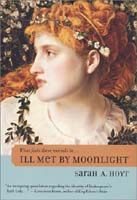Ill Met by Moonlight
(This review originally appeared in Mythprint 39:5 (#242) in May 2002.)
Reviewed by Matthew Scott Winslow
It takes either extreme courage or extreme naivete for an author in her first novel to choose as her protagonist an author that many consider to be the greatest author in the English language, and some even consider the greatest author ever. William Shakespeare is, like his writing, much bigger than life, so to include him in a story, one must either have an incredible command of the English language (enough to fool the readers) or one must reduce Shakespeare’s speaking to that of ‘the common man.’ I¹ve seen both attempted, and it is usually the former and not the latter that succeeds. However, Sarah Hoyt, in her first novel, Ill Met by Moonlight, appears to have enough language skill to attempt to show us the young Shakespeare with all his verbal power in its still nascent form and to make it overall convincing.
Ill Met by Moonlight details what happens when Shakespeare’s newly acquired wife, Anne Hathaway (known as Nan throughout the book) and his only slightly newer daughter, Susannah, are kidnapped by the tyrant elf-king, Sylvanus. Will blunderingly comes across them and finds himself caught up in a power struggle between Sylvanus and the rightful heir to the elf-throne, the king’s younger brother Quicksilver. A quick read, the novel does not produce too many complex plot twists, but neither does it become simplistic in its plot. Instead, we find just one plot line developing as Quicksilver attempts to use Shakespeare for his revenge and instead ends up learning that mortals aren’t as much fools as he thought. As a first novel, this is an incredibly strong effort. Hoyt shows that she is quite familiar with the Shakespearean canon and the novel is riddled with verbal echoes, from out and out quotes — such as Herne the Hunter pondering ‘To be or not to be?’ — to oblique references. This wordplay is itself reminiscent of Shakespeare. Although I wouldn’t go so far as to claim that it is of his caliber, it does add strength to the novel, just as Tom Stoppard’s script to Shakespeare in Love was strengthened by all the off-hand Shakespearean quotes heard in passing.
While being a good fantasy, the mythopoeic element of the novel is virtually nonexistent, using instead a more syncretic idea of fantasy, taking many fantastic tropes both from Shakespeare and from 20th-century fantasy to construe an enjoyable novel. If Hoyt has any more Elizabethan-era stories to share, I’ll definitely listen.

